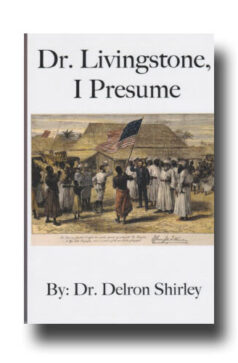I’ve already suggested in the last chapter that the New Testament message about walking is essentially the story of walking in the Spirit. In Galatians 5:25, the Apostle Paul admonished us, “If we live in the Spirit, let us also walk in the Spirit.” There is a tremendous difference between just living and walking. Our being alive is dependent on others, but walking is self-dependent. It is our mother and father who are responsible for our being alive, but we are individually responsible for our walking. Any time we let someone else do our walking, we cease to walk and start to ride. In the spiritual realm, we are alive because of God’s action.
For God so loved the world, that he gave his only begotten Son, that whosoever believeth in him should not perish, but have everlasting life. (John 3:16)
And so it is written, The first man Adam was made a living soul; the last Adam was made a quickening spirit. (I Corinthians 15:45)
But God allows us to do our own spiritual walking. He will guide our steps and support us if we falter, but He will not do our walking for us. One fast food restaurant boasts, “We do it all for you.” But God doesn’t make that same claim. He will give us dramatic instant deliverances, but then He commands us to follow through with the day-to-day disciplined walk that lives out that deliverance. When we do, we begin to mature into His stature.
Walking has to do with progression. Unlike plants that are stationary, man can advance and move forward. In Japan I saw a Bonsai tree the size of a seedling although it was seventy-five years old. In the mountains of California, I once viewed the Bristol Pines which were almost four thousand years old but about the size of regular trees. A few miles away, I marveled at the giant sequoia trees and redwoods that were almost as old but massive enough to prove their age. Regardless of how long these trees had lived, none of them have moved even an inch away from where they first sprouted. They have life, but not forward progress. Man, on the other hand, has the potential to progress; he can advance; he can achieve; he does not have to remain stationary and stagnant. If a man does not progress, he is considered to be “vegetating” – becoming like one of those stuck-in-the-same-spot trees. Perhaps this is why the Bible speaks so frequently and pointedly about walking. God wants us to be progressive achievers.
When Paul challenged the Roman believers to walk in newness of life (Romans 6:4), he seems to have handpicked his terms. He chose the Greek word for “walk” which means to progress at one’s own volition rather than the term that implies a regimented march. Thus, he suggests that the Christian walk is to proceed from the freshness of the spirit man rather than from a mechanical following of the letter of the law. The term “newness” means new in nature rather than simply new in time. Three Greek words were available for the apostle to choose from for the word “life.” His choice was zoe (the life of the spirit man), rather than bois (the life of the physical man), or psuche (the life of the soulical part of man). In other words, our Christian walk is not to be an emotionless march through life dictated by a disciplined system of “do”s and “don’t”s barked out at us by a spiritual drill sergeant; rather we are to be always progressing – but not on a regimented timetable that prohibits us from stopping to smell the roses along the way. Walking in the newness of life is walking in the spirit where there is liberty, righteousness, peace, and joy.
The many facets of a Christian’s walk include:
Honesty, “Let us walk honestly, as in the day; not in rioting and drunkenness, not in chambering and wantonness, not in strife and envying.” (Romans 13:13)
Faith, “For we walk by faith, not by sight.” (II Corinthians 5:7)
Good works, “For we are his workmanship, created in Christ Jesus unto good works, which God hath before ordained that we should walk in them.” (Ephesians 2:10)
Love, “And walk in love, as Christ also hath loved us, and hath given himself for us an offering and a sacrifice to God for a sweet smelling savour.” (Ephesians 5:2)
Wisdom, “Walk in wisdom toward them that are without, redeeming the time.” (Colossians 4:5)
Truth, “I rejoiced greatly that I found of thy children walking in truth, as we have received a commandment from the Father.” (II John 4)
Without condemnation, “There is therefore now no condemnation to them which are in Christ Jesus, who walk not after the flesh, but after the Spirit.” (Romans 8:1)
Peace, “And as many as walk according to this rule, peace be on them, and mercy, and upon the Israel of God.” (Galatians 6:16)
Worthiness, “I therefore, the prisoner of the Lord, beseech you that ye walk worthy of the vocation wherewith ye are called.” (Ephesians 4:1)
Circumspectness, “See then that ye walk circumspectly, not as fools, but as wise.” (Ephesians 5:15)
Increasing knowledge of God, “That ye might walk worthy of the Lord unto all pleasing, being fruitful in every good work, and increasing in the knowledge of God.” (Colossians 1:10)
Fellowship with Christ and cleansing from sin, “But if we walk in the light, as he is in the light, we have fellowship one with another, and the blood of Jesus Christ his Son cleanseth us from all sin.” (I John 1:7)
Not after the flesh, “That the righteousness of the law might be fulfilled in us, who walk not after the flesh, but after the Spirit.” (Romans 8:4)
Not after human manners, “For ye are yet carnal: for whereas there is among you envying, and strife, and divisions, are ye not carnal, and walk as men?” (I Corinthians 3:3)
Not after craftiness, “But have renounced the hidden things of dishonesty, not walking in craftiness, nor handling the word of God deceitfully; but by manifestation of the truth commending ourselves to every man’s conscience in the sight of God.” (II Corinthians 4:2)
Not in the vanity of our minds, “This I say therefore, and testify in the Lord, that ye henceforth walk not as other Gentiles walk, in the vanity of their mind.” (Ephesians 4:17)
After the commandments of the Lord, “And this is love, that we walk after his commandments. This is the commandment, That, as ye have heard from the beginning, ye should walk in it.” (II John 6)
Not disorderly, “Now we command you, brethren, in the name of our Lord Jesus Christ, that ye withdraw yourselves from every brother that walketh disorderly, and not after the tradition which he received of us.” (II Thessalonians 3:6)
These qualities and functions certainly are God-produced, but they are actually products of the human spirit that has been touched and regenerated by the Holy Spirit. When we look at the scriptures and see that many times the term “spirit” is spelled with a capital “S” rather than a lower case letter, we immediately think that the reference is to the Holy Spirit. However, we must remember that the original Greek text had no capitals. The capitals were added by the King James translators in 1611. Therefore, it is just as likely that the passage should be read with a small “s,” meaning human spirit. I would contend that when Paul speaks of walking according to the spirit that he is not talking about the Holy Spirit but about the human spirit. If we look at the whole context of Galatians chapter five, we will see that Paul is describing the confrontation between the flesh and the spirit. It is only logical that if Paul is talking about the human flesh then the opposite would be the human spirit. If he is taking about the detriment of living according to the human flesh, then we should think that the flipside or antithesis of that could be living according to our human spirit. If he were talking about the Holy Spirit then it would mean that God would do it for us. In reality, most of the passages that refer to living and walking in the spirit are actually referring to our human spirits. All these benefits come from our born-again nature.
When my sons were young, all we had to do at our house was mention the word “walk” and the whole house would come alive. The dog would snap up her leash, run to the front door, and begin to jump eagerly until we met her there to open the door. Our boys would pull on their shoes and beg for someone to tie the laces. When they got a bit older, they would head for the storage shed to get a bike or go-cart. My wife and I would grab hands and leave the chores and cares of life behind for a few minutes as we strolled across the front lawn and down the walk. This is exactly the scene that should take place in our spirit man when we realize that our God has invited us to walk with Him. When we realize what the results of our fellowship walk with Christ can be, we will truly relish the opportunity to take the time to walk with Him.
Galatians 5:16-18 tells us that we will no longer fulfill the lusts of the flesh or live under the soulical rule of the Law if we walk in the spirit.
This I say then, Walk in the Spirit, and ye shall not fulfil the lust of the flesh. For the flesh lusteth against the Spirit, and the Spirit against the flesh: and these are contrary the one to the other: so that ye cannot do the things that ye would. But if ye be led of the Spirit, ye are not under the law.
Verses twenty-two and twenty-three go on to tell us that we can produce wonderful fruit in our lives when we walk in the spirit. This fruit is the spiritual answer to the destructive works of the flesh. The next verse sums up the power of walking in the spirit by saying that those who live this way actually have crucified the flesh and its affections. That means that the old man is dead and powerless. What a wonderful provision – by simply walking in the spirit, the carnal forces over our lives are totally eradicated. Because we are no longer living under the devil’s power, we are free to mature into the full stature of the new man who lives in us – the one who is developing from the DNA implanted by God Himself.
Walking in the spirit is not a regimented march, but there are some guidelines given in the scripture to help us develop a more beneficial spiritual life. To make them easier to remember, I have listed the key words in an order that spells out the word “walking.”
Worship, “But the hour cometh, and now is, when the true worshippers shall worship the Father in spirit and in truth: for the Father seeketh such to worship him.” (John 4:23)
Attention, “My son, attend to my words; incline thine ear unto my sayings.” (Proverbs 4:20)
Live, “That which is born of the flesh is flesh; and that which is born of the Spirit is spirit. Marvel not that I said unto thee, Ye must be born again.” (John 3:6-7)
Know the spirit, “For what man knoweth the things of a man, save the spirit of man which is in him? Even so the things of God knoweth no man, but the Spirit of God. Now we have received, not the spirit of the world, but the spirit which is of God; that we might know the things that are freely given to us of God. Which things also we speak, not in the words which man’s wisdom teacheth, but which the Holy Ghost teacheth; comparing spiritual things with spiritual. But the natural man receiveth not the things of the Spirit of God: for they are foolishness unto him: neither can he know them, because they are spiritually discerned. But he that is spiritual judgeth all things, yet he himself is judged of no man. For who hath known the mind of the Lord, that he may instruct him? But we have the mind of Christ.” (I Corinthians 2:11-16)
Imitate Christ, “He that saith he abideth in him ought himself also so to walk, even as he walked.” (I John 2:6)
Nourish your spirit, “Be not deceived; God is not mocked: for whatsoever a man soweth, that shall he also reap. For he that soweth to his flesh shall of the flesh reap corruption; but he that soweth to the Spirit shall of the Spirit reap life everlasting.” (Galatians 6:7-8)
Grow, “But speaking the truth in love, may grow up into him in all things, which is the head, even Christ.” (Ephesians 4:15)
Going through these various steps to produce the ultimate product of “walking” seems to be symbolic of a truth that if we take enough steps, we are walking. Have you ever purchased an item to find that the box says, “Some assembly required”? Upon opening the package, you find a sheet or manual with a number of steps to follow in order to put your item together. This step-by-step instruction is called “walking you through the process.” Paul, as a Hebrew rabbi, was an expert in step-by-step instruction called halakah, from the Hebrew word for “walk.” Because much of his writings involved this regimented goal-oriented teaching style, he sometimes used a strong Greek term for “walk” which carried with it the force of a disciplined walk rather than a casual stroll. He drops in this strong term just often enough to reconfirm that we must take our Christian walk seriously and diligently work at it even though we are not to feel that we are on a grueling march. Perhaps that’s the reason he strategically positions the word “should” in Romans 6:4, “We also should walk in newness of life.” He knows that it is an obligation which some will not fulfill. It is no wonder Paul told us that we should walk in newness of life!
Perhaps the only person who has ever experienced walking totally in newness of life was Jesus Christ Himself, who told us that His key to living was to say and do only as He was directed by the Father.
Then answered Jesus and said unto them, Verily, verily, I say unto you, The Son can do nothing of himself, but what he seeth the Father do: for what things soever he doeth, these also doeth the Son likewise. (John 5:19)
Yet, living and walking in the spirit portion of our human nature may not be as simple as it sounds. The Apostle Paul tells us that our physical makeup is constantly struggling against the spiritual portion, resisting every attempt that we put forth to live and walk only according to our God-consciousness.
What are the good results of our walking in the spirit? According to Galatians 5:16-18, we will not fulfill the lusts of the flesh. We will no longer be under the Law because the power of the Law works through our carnal man. We will be freed from the flesh by walking in the spirit. According to Galatians 5:22-23, we will be able to produce the fruit of the spirit. Galatians 5:24 adds that we are able to crucify the flesh with all of its lust and affections. It is one thing just to live where we are not subject to the flesh, but we enter a totally new dimension when the whole matter of our fleshly life has been crucified! In the first case, the lust of the flesh is still there, haunting us; we just aren’t fulfilling it. In the second case, that lust is crucified, and we are totally done with it. There is a total freedom from it because it doesn’t exist anymore.
Our walking in the spirit will produce stronger and stronger results every day. But the key is birthed in recognizing the difference between our soul and our spirit. We must make the decision to walk in the spirit and not in the soul because the soul will lead us into confusion. There is only one thing that separates the spirit from the soul – the Word of God. (Hebrews 4:12) In everything that happens in our lives, we must determine what the Word of God says about that individual situation.










